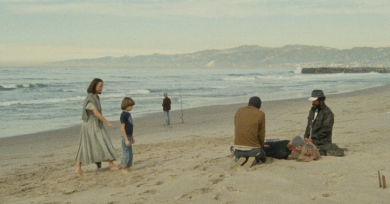Shonni Enelow
The making of the play provides the dramatic scaffolding for the unfolding of life, but both the skit and the college life that surrounds it are presented as spontaneous, oblique, and devastating in their elisions.
Good One's Sam is passive and withholding in her conversations with Chris and Matt. She does not expect them to pay attention to her feelings or consider her needs or experience. But Lily Collias, the actor, is thrillingly open and non-defensive.
Between the writtenness of the text and the flat planes of the modernist upstate house Martha has chosen as the location to end her life, the film’s melodrama tips into abstraction.
Like all cultural practices, film acting is a historical palimpsest: new affects, tones, and gestures jostle with older ones, and what makes something feel contemporary is often a matter of some contingency.
You do not need to know that the filmmaker was inspired by the story of Oedipus to pick up on the evocation of this power of tragedy, or the setting in a heightened, mythic Greece. The film has an elemental strangeness that feels close to the world that ancient tragedy depicts: we see a forest, we see water, we see blood.
Lacey is our observer, but we sense that she does not really want to be. She tries to penetrate her mother’s sadness, but remains outside the adult world of her lovers and friends, pains and longings.
What a pleasure to watch a movie without a guilty conscience. What a relief to get to enjoy what everyone knows: movies create us, in our own fantasies and other peoples’, in our behaviors and expectations, in our public selves and erotic drives.
This is a psychological ghost story, to be sure, with classic elements of that genre; where Hogg departs from its typical analogies, however, is in her location of the mystery not in the unconscious of one person but in a relationship with an other.
You could call it a 1970s hangover movie: the triumphant colors of Mur murs have washed out. Even the beach looks bleached, and the celebratory, rebellious atmosphere has turned to quiet defeat.
The radical in everyday life in a new American docu-comedy series and a classic by Abbas Kiarostami.
Jimmie cannot lay claim to the house as he wants to, cannot stabilize and contain his feelings about his family and himself. But the greater loss is that the city has no place for Mont’s theater.
The more completely you excavate the personal, the more impersonal it becomes. This is because the technical skill required to represent interiority with such a fine grain is fundamentally exterior.
We should credit Binoche as the true author of Clouds of Sils Maria because this, in fact, is what the film itself concludes.
Even as archetypical “Anne” in Code Unknown, one of her least adorned performances, the tension of those supposed contradictions––generosity and narcissism, tidal emotion and awareness that she’s being watched––is both what animates her scenes and what gives them a critical edge.
Were Evangeline more sympathetic and self-aware, we might ask ourselves how our enjoyment of Howard is so different from hers of Madeline, and how our continued appetite for performances of female psychological fracture fits into a history of condescension and exploitation.
Not only is it very difficult to isolate the formal elements of a performance, but it is also very difficult to isolate what makes a particular performance or performer look or feel better or even different from another without getting into extremely complex cultural codes and idioms.
This is a film, written and directed by a man—Olivier Assayas—about the relationship between the male auteur and the female performer, that begins with the death of one idealized version of the former and ends with the determined, if uneasy, triumph of the latter.
















